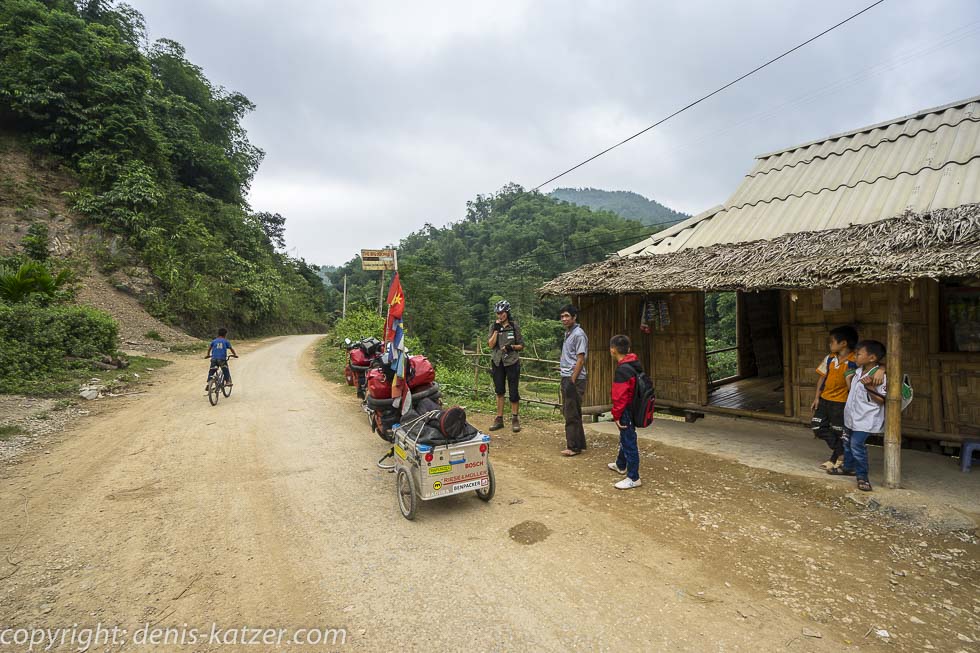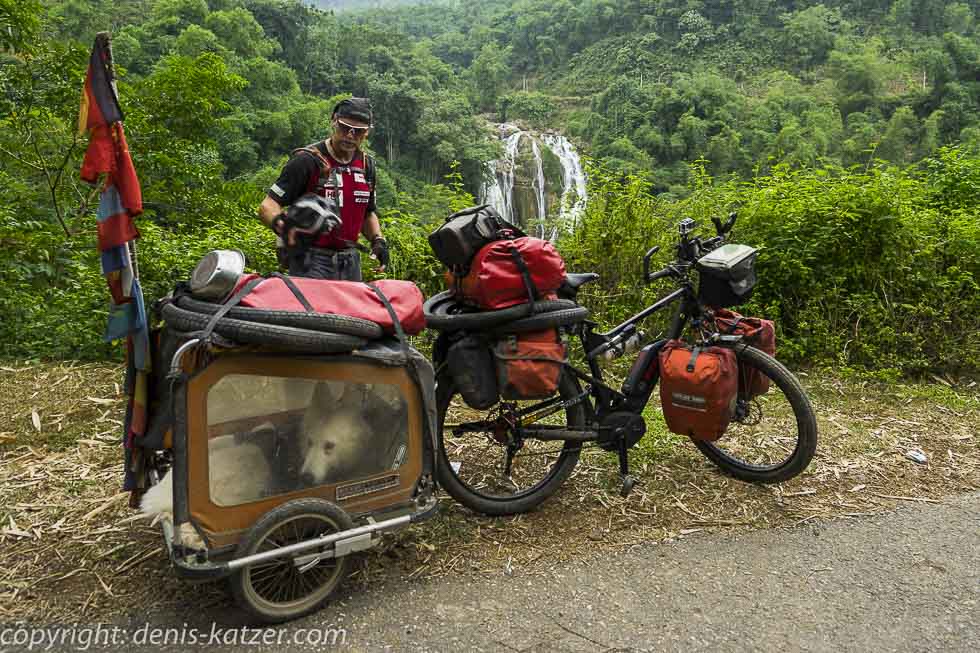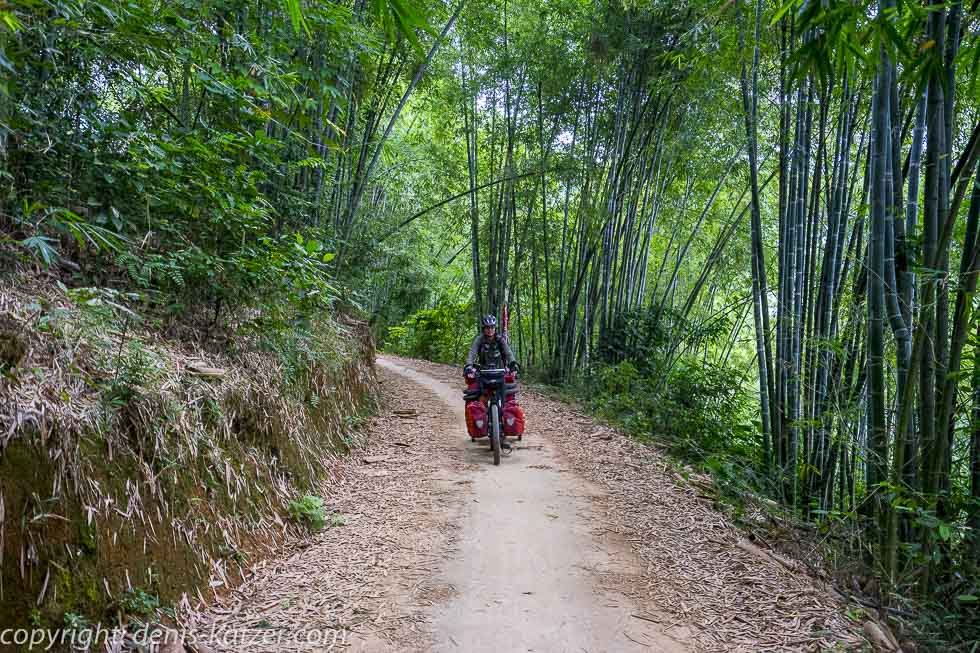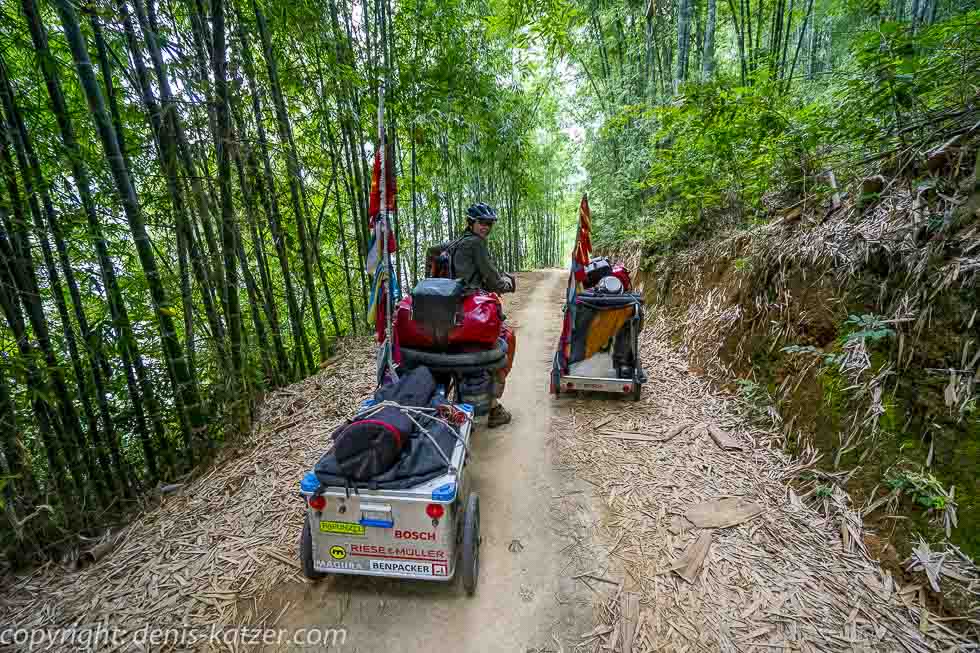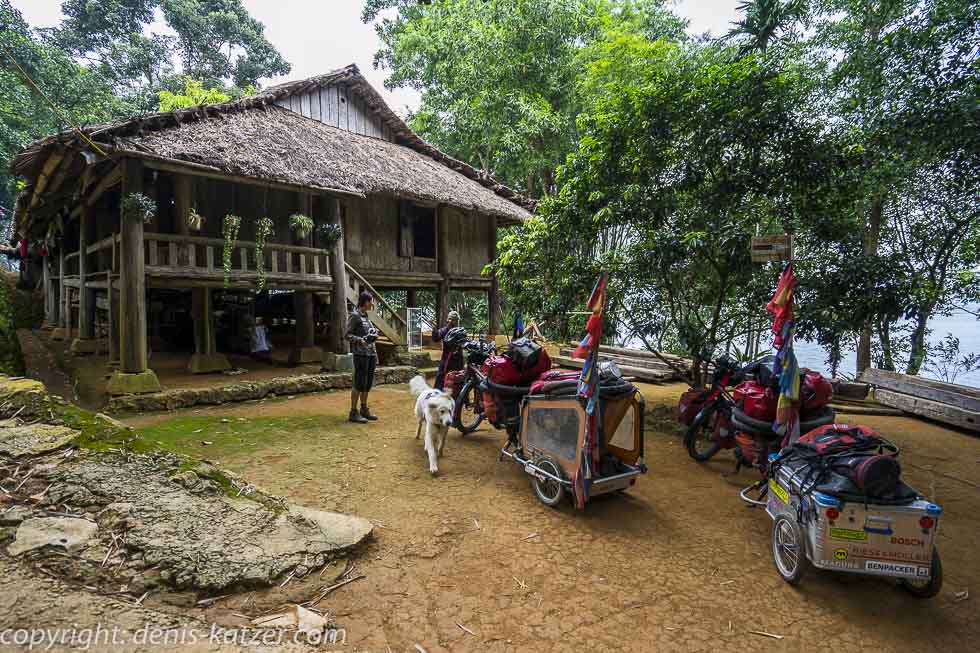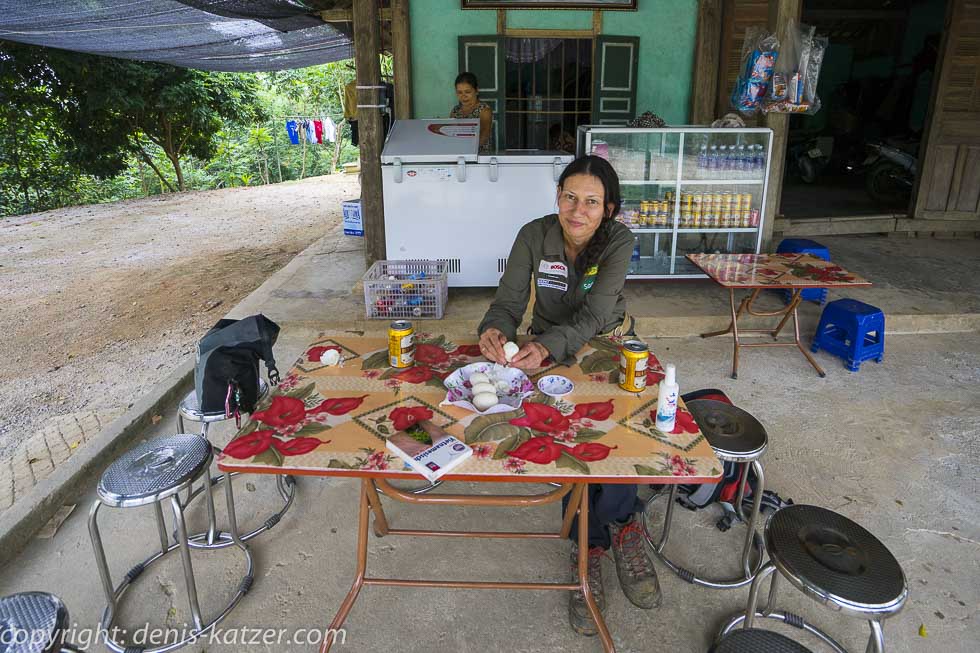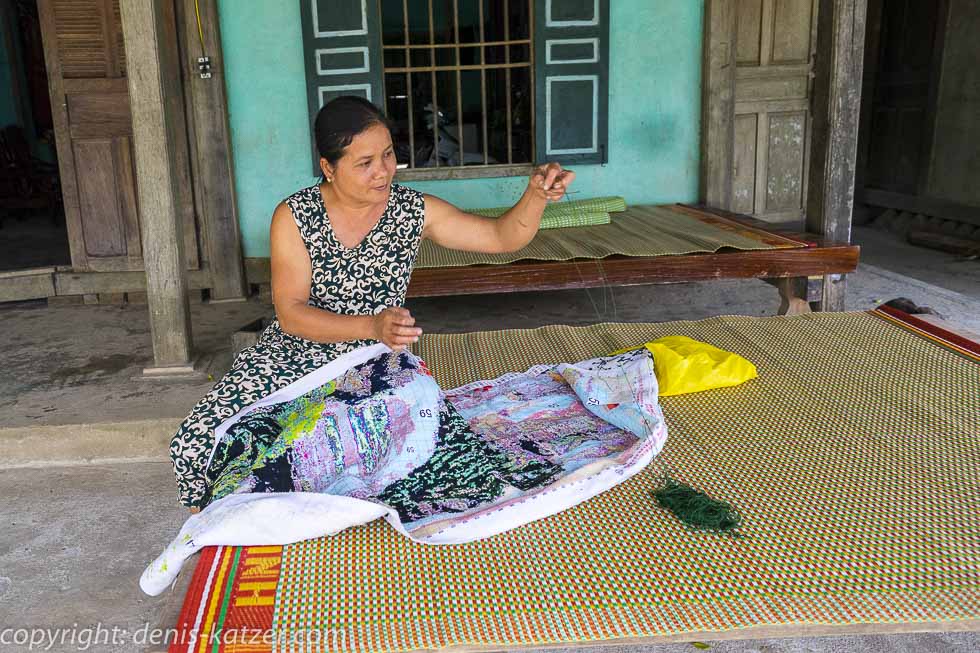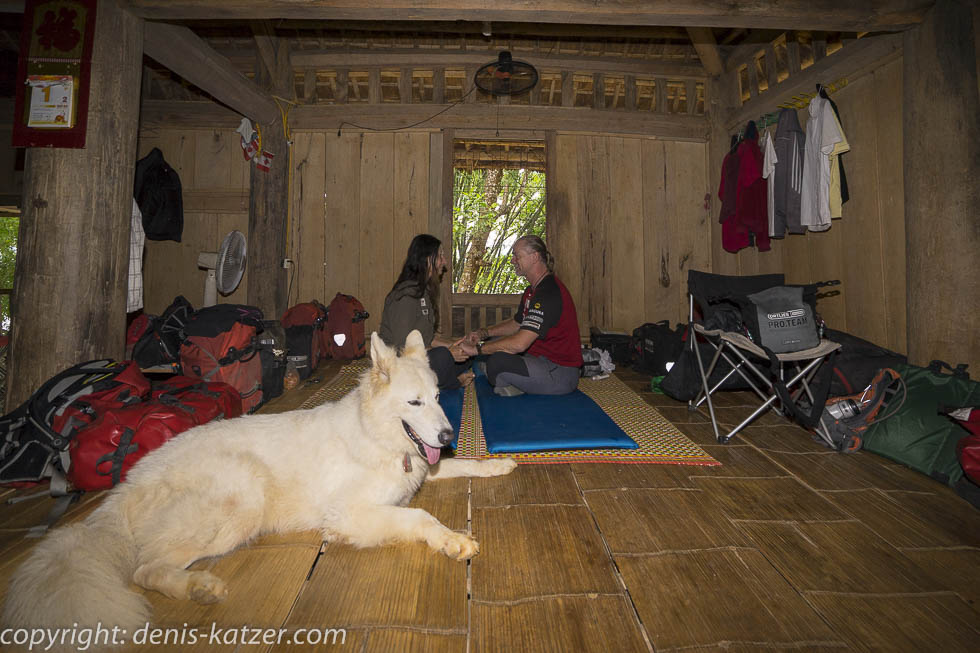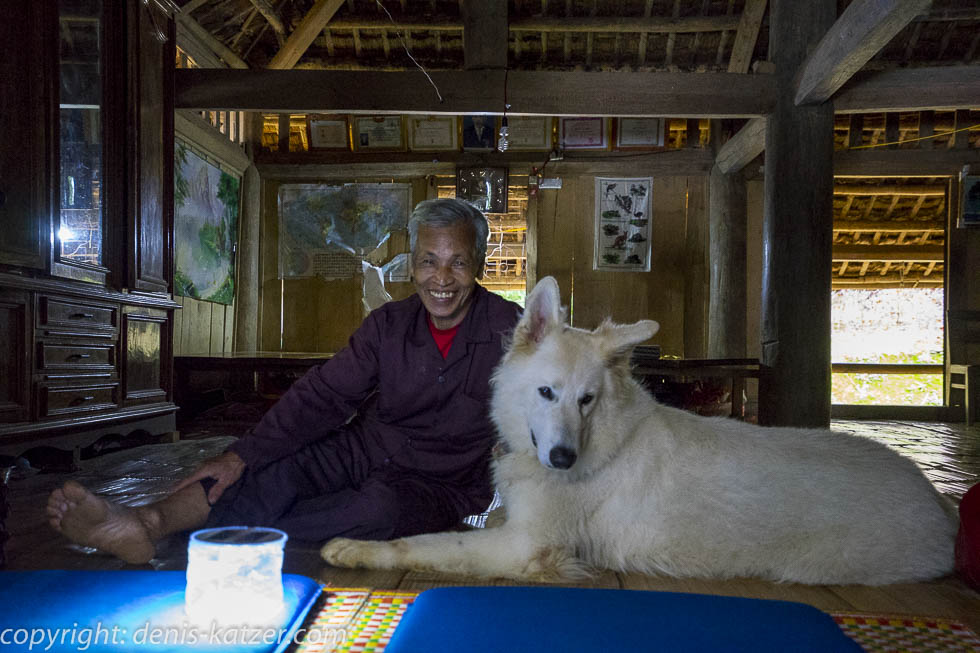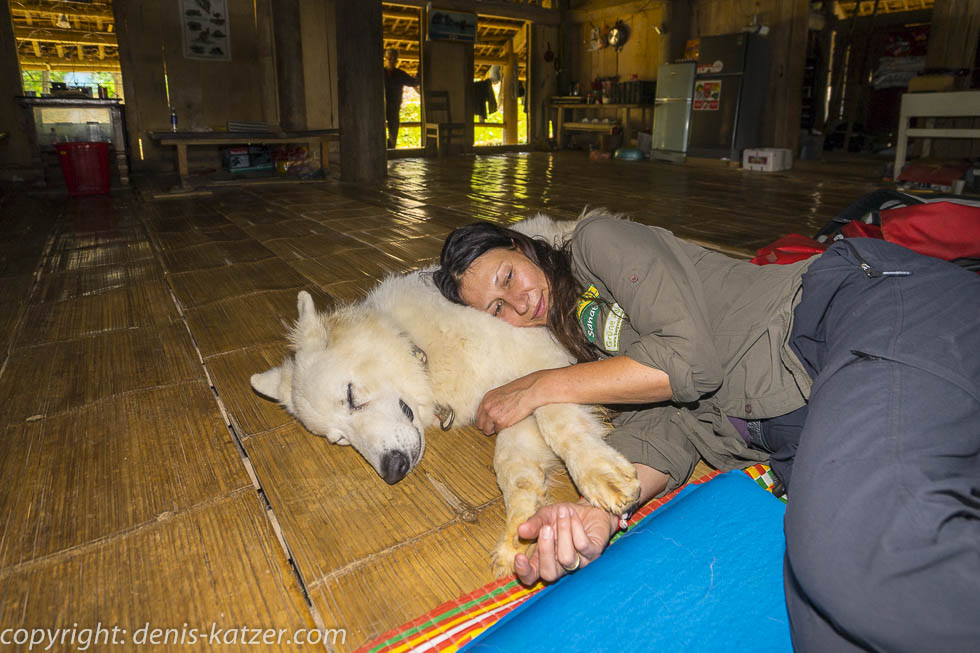
Will Mai Chau let us go?
N 20°45'16.1'' E 105°04'30.7''
Date:
07.11.2016
Day: 500
Country:
Vietnam
Province:
Hòa Bình
Location:
Homestay by the lake
Latitude N:
20°45’16.1”
Longitude E:
105°04’30.7”
Daily kilometers:
19 km
Total kilometers:
20,366 km
As the crow flies:
11 km
Average speed:
16.9 km
Maximum speed:
32.8 km/h
Travel time:
1:06 hrs.
Soil condition:
Asphalt / gravel
Maximum height:
270 m
Total altitude meters:
54.941 m
Altitude meters for the day:
280 m
Sunrise:
06:06 h
Sunset:
5:20 pm
Temperature day max:
16°C
Departure:
10:00 a.m.
Arrival time:
12:00 p.m.
(Photos of the diary entry can be found at the end of the text).
Heavy cloud cover and light drizzle make us doubt whether today is a good day to set off. It’s not that we’ve become so soft and long-distance cyclists shy away from the wet and rain, but what’s brewing in the sky right now is the harbinger of another typhoon. “If I were you, I’d stay a few more days and wait out the bad weather,” says another traveler. “God forbid,” I groan, as this Mai Chau is starting to creep me out. “It just won’t let us go,” says Tanja, not in the best of moods. “It’s only 20 kilometers to the war veteran’s stilt house. If the foothills of the typhoon really get lost in this region, we’ll just stay there. I think a change of location will do our psyche good,” I think aloud. “Definitely. I’ll have a crisis if we stay any longer. It’s nice here, but too long is too long. After all, we want to see something different from Vietnam,” Tanja agrees. “I just hope the veteran is still living in his stilt house. He wanted to move a few weeks ago. Do you know if he still lives by the lake?” I ask Ka. “I’ve already tried to call him but he doesn’t answer his cell phone. But I think he’s still there,” replies the manager of the Nature Lodge. Believing means knowing nothing, I think. “Hm, we’ll just try it. If he’s already left his house, we can always drive back. We’ve practiced that by now,” I decide. “Or we could just pitch our tent there,” says Tanja resolutely.
This time there is only a small farewell. Since Manh Do left for Hanoi the day before yesterday and the employees are all working, only Ka is present. “Wish you better luck this time. Take care of yourselves,” he says, hugging us. “We’ll do that. And you should take a break from time to time. You haven’t had a single day off since we met,” I advise. “Ha, ha, that’s right. I’ll remember that when I get the chance. For now, I have to help set up the store here,” he replies, calling after us.
20 minutes later, we leave the spot on the right where the trailer drawbar drilled into Tanja’s rear wheel two days ago. “Hurray!”, I shout and wave after the ominous patch of earth. We leave the main road. Our tires now roll over the narrow, partly unpaved mountain road. It winds its way upwards for 100 meters, only to immediately wind its way back down again. “How’s it going with you?” I call out. “Great and yours?” “Also very good.” Tanja lets her bike roll down the climbs very cautiously. “Don’t worry about it. The new angle won’t break. Your trailer is at least 18 kilograms lighter and the roads will certainly get better soon.” “Yes, yes. I think so. But I’m still a little shaken up by the breakdown. It’ll get better once we’ve been on the road for a few days.”
We leave the narrow mountain road and follow an even narrower path. It’s a steep descent and the ground is damp because of the rain. The giant bamboo grows up to 70 cm during the day and arches 30 to 40 meters above our heads. I pull the brakes to take a few pictures of the overgrown, exotic path. “Looks like we’re driving through the gateway to a fairytale world,” I say in high spirits. “A fascinating plant,” Tanja replies, looking up. Under the canopy of the bamboo forest, we reach the stilt house of war veteran Hung. We put our bikes on the stands and walk around the deserted-looking house. “Hello, hello there! Is anyone home!” I shout. Nothing moves. I climb the old, creaky wooden stairs and look through a window without a pane. “Someone’s asleep,” I whisper to Tanja. “Hello!” I call cautiously and knock against the wooden wall. “He sleeps like a bear in winter,” I say and climb back down. “Xin chào” (hello), a voice suddenly greets us. Just seconds later, a little man follows her. “Xin chào”, we return his greeting. When Hung sees Ajaci, he recognizes us too. A smile appears on his sun-tanned face. He happily greets our dog, who jumps around Hung wagging his tail. “Can we sleep in your stilt house tonight?” we ask. “Không vấn đề gì”, (No problem) we understand and are relieved. Hung uses sign language to draw our attention to the fact that the power has failed. “Không vấn đề gì”, (No problem) I reply.
While Tanja carries our equipment into the wooden house resting on thick tree trunks, I push our horses under the house and lock them to one of the trunks with two thick steel ropes. Then I go upstairs too. I take off my shoes in front of the large room on wooden stilts and only now do I step over a thick wooden threshold into the room. Every step on the coarse bast mats creaks softly but not unpleasantly. My gaze falls downwards through the slits in the thin mat rods woven together. Our wheels can be seen in silhouette. Hung assigns us a corner at the back right where we can put our bags. Then he offers us the bitter hot green tea. We sit down on a kind of solid wooden bench while Hung pours two dirty little ceramic mugs from a teapot. We now sit opposite each other in silence and drink the bitter brew. The boy who slept in the house when we arrived speaks a little English. It turns out that he has come from Hanoi with a few other workers to renovate Hung’s house. “What will happen to the house?” I ask. “It will be a new and bigger homestay for tourists,” we hear. As we haven’t registered our arrival, Hung and his wife Hoe have nothing for us to eat. “Không vấn đề gì”, we say and ask if there is a restaurant on the street. Dung, the young man from Hanoi, nods his head in confirmation.
At around 14:00, Tanja, Ajaci and I walk through the mystical bamboo forest to the pass road. We ask for food at a wooden hut. We get a shake of the head. Apart from the nasty, cheap ready-made soups, there is nothing. Even at the last hut, our question about food is denied. We discover raw eggs in a display case. Using sign language and our Vietnam language guide, we ask if the woman can cook the eggs. “Không” (no), we hear. “I don’t think she understood us”, I am convinced, find the cooking area in a wooden shed and point to the fireplace and a cooking pot. “Water and eggs in the pot,” I try to explain, imitating the sound of burning wood. “Hi, hi, hi,” the woman laughs at my pantomime, picks up the eggs and puts the pot of water on the fire. 20 minutes later, Tanja and I eat five eggs each and wash them down with warm beer. “It’s crazy how quickly you have to get used to the simple life in this country,” I say, smacking my lips. “Good for the line,” Tanja replies, amused. We sit on simple metal stools and enjoy the absolute peace and quiet. Then it starts to rain. Is the typhoon coming?” asks Tanja, “Maybe. It doesn’t matter. We’re staying at Hung’s and if it keeps raining like this, we’ll just stay for a few days. We’re well trained in that by now.” “Ha, ha, ha. That’s exactly what we’ll do. The main thing is that we’ve finally made the jump from Mai Chau.” “I don’t want to be pessimistic, but we’re still in the banished area of this small town. I won’t really believe it until we’ve gone another 100 or 200 kilometers,” I reply, washing down the dry egg with a large gulp of canned beer.
In the evening, Hoe prepared us a simple meal of white rice and green vegetables. “Can your Ajaci eat rice?” asks Hung, who pets him incessantly and has obviously taken a fancy to him. “Sure, he likes rice,” Tanja replies and pours the contents of Hung’s bowl into his bowl. At 20:00 Hung hangs up green cloths to separate the room. So the young man Dung, Hung, his wife Hoe and we have a bit of privacy in the stilt house. I unroll the sleeping mats under our mosquito net and inflate them. In the corner of my eye I see a small mouse whizz past the net. “Leave them alone,” I admonish Ajaci, as I don’t want him to suddenly race through the stilt house like an arrow and scare our housemates. We lie down on the sleeping mats and while Tanja reads her e-book, I let the beam of my head torch glide through the mosquito net to spot a few mosquitoes that have strayed inside. Meanwhile, a spider is in the process of setting up its home in the crown of the web. Their eight dotted eyes reflect in the beam of my headlamp. She seems to be hastily working on her filigree net. A breeze sweeps across the lake, pushes through the open window behind us and makes our mosquito and spider webs vibrate. I watch them for quite a while and let them be. My eyes glide wearily through this old house, wondering what it has seen over the last 50 years. Hung, who told us a few weeks ago that he had shot down an American warplane and was awarded a medal for it, now tells us that during the last Vietnam War, an important weapons transshipment point of the Việt Minh was located right here. “From here, important weapons were smuggled across the river to the north,” he said with pride in his voice. Did this hidden house in the giant bamboo forest play a role? And was Hung involved in the smuggling?it goes through my head.
I look at the dried palm leaves covering the roof. It nibbles and rustles above our heads. The wind blows through the window again. This time the mosquito net wobbles back and forth on its hook. Are these the harbingers of the typhoon? another thought flits through my mind. I wonder whether we can continue tomorrow or not. Apart from that, Hung’s stilt house is a welcome change from life in the lodge and certainly worth a longer stay, I think to myself and no longer realize how my eyes are falling shut…
If you would like to find out more about our adventures, you can find our books under this link.
The live coverage is supported by the companies Gesat GmbH: www.gesat.com and roda computer GmbH http://roda-computer.com/ The satellite telephone Explorer 300 from Gesat and the rugged notebook Pegasus RP9 from Roda are the pillars of the transmission. Pegasus RP9 from Roda are the pillars of the transmission.
